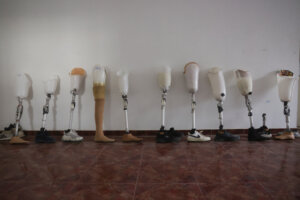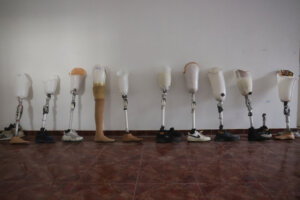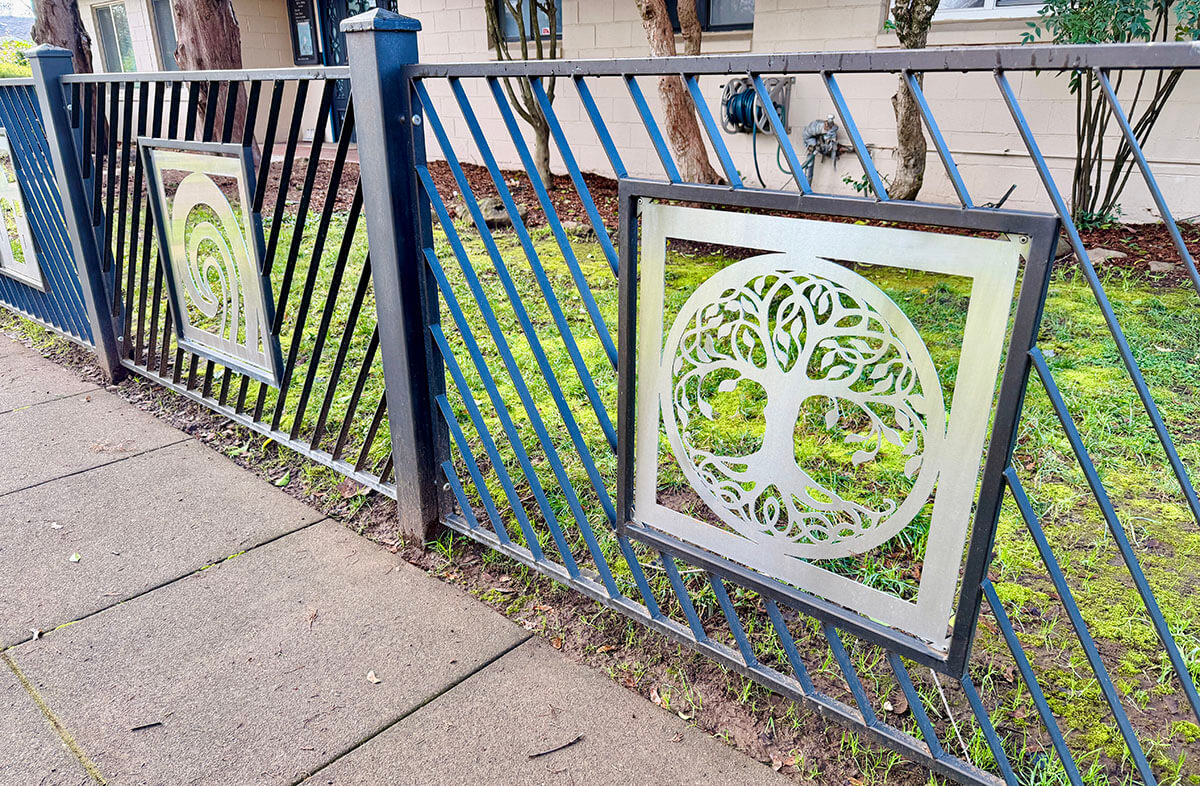Uncategorized
A new documentary humanizes Israeli soldiers. It also alleges war crimes.

“It feels like a betrayal to be interviewed by foreign media,” an IDF combat veteran says. He’s out of uniform, brow furrowed, plucking nervously at his goatee. His name is Yuval Ben-Ari, and he is here — on camera, using his real name — telling us what he saw in Gaza.
Ben-Ari, who served in an infantry unit, is one of nearly a dozen soldiers who appear in Breaking Ranks: Inside Israel’s War, a new documentary from indie production company Zandland which streamed in the U.K. and can be viewed on YouTube. Four of the speakers appear on camera, identified by their real names; the rest are disguised and use aliases. Taken together, their testimonies are a scathing indictment of what Israeli Prime Minister Benjamin Netanyahu has called the “world’s most moral army.”
If their stories are true — and nearly everything the soldiers say has already been corroborated by other media reports — they are describing war crimes as the rule in Gaza, not the exception. Unarmed civilians are shot or bombed as a matter of course. Homes are torched without cause. Humanitarian aid sites are shelled out of sheer resentment. The people telling us this — young men and women who served hundreds of days in the territory over the past two years — are still reckoning with their role in the destruction.
Breaking Ranks is not the first documentary to be made about the war in Gaza, and it will not be the last. But it may be the only one to focus on the targeting of innocent Palestinians while also humanizing Israeli soldiers. The soldiers outline their belief in the IDF and the importance of the mission in Gaza. The film contextualizes the war, showing footage of the atrocities of Oct. 7 and noting that Hamas leaders, too, have been charged with war crimes in international courts. Palestinian casualty figures are provided, the film notes, by the “Hamas-run Gaza health ministry”; the tunnel network, it explains, is used for smuggling and warfare. It does not avoid discussing the 251 Israeli hostages.
Those elements ultimately strengthen the film’s argument about how the war was conducted. They do not, however, soften the accounts that follow. The picture that emerges is one of lawlessness and cruelty, coupled with a tolerance for collateral damage and a lack of accountability that runs counter to the IDF’s “Purity of Arms” statute. Yet that portrait also shows the rank-and-file — not all, but some — resisting the practices of their superiors.
A tank commander (“Daniel,” an alias) recounts a time his commander informed troops he planned to destroy a humanitarian aid building. The unit warned him the building was off-limits, but the commander shelled it anyway. Then — according to the soldier — the commander made up an excuse to justify the attack: “I had an anti-tank weapon pointed at me.”
A member of a different unit tells a similar story: When a man hanging laundry on the roof of a building is deemed a “spotter,” a commander shells the structure, killing and injuring many people inside. “This kind of thing happened every week,” says the soldier telling us this story. “And that’s just my unit.”
A platoon sergeant, using the alias “Yaakov,” tells how a pair of Palestinian teenage boys came to be his unit’s human shields, sent down into Gaza’s tunnels as scouts. The unit’s objections eventually won out — they cited international law — but Yaakov insists the IDF has a policy sanctioning the practice called “Mosquito Protocol.” (The Associated Press published an investigative report on the practice earlier this year; the IDF denies that it uses human shields.)
“I carried out these things,” says Yaakov. “I hope I can find a way to live without feeling shame with every step I take.”
One soldier says his unit once reported killing 112 people over the course of a deployment. Only one of the 112, he said, was even suspected of holding a weapon.

Not all of the soldiers recalling their enlistment in Breaking Ranks regret their participation. We meet Rabbi Avraham Zarbiv, who claims to have invented the tactic of razing entire Gaza neighborhoods, block by block, with a bulldozer. Another, given the alias “Lt. Col. F.,” says he would have happily pushed every Palestinian in Gaza into the ocean, given them snorkels and “let them swim to Egypt.”
Their hawkishness puts the defiance and disillusionment of soldiers like Yaakov in stark relief. And it raises questions as to why the IDF — which says it has launched dozens of Military Police investigations into alleged misconduct by soldiers — has not found more wrongdoing.
Ben-Ari, who admits that after Oct. 7 he was “consumed by rage and a desire to fight and avenge,” has since become a peace activist; he was injured last week in the West Bank, attacked by Israeli settlers, while accompanying Palestinians during the annual olive harvest.
He vows to never return to Gaza. But Ben-Ari will not quit the IDF entirely, either. Toward the end of the film, he says he would answer a call to protect Israel’s other borders because that is what he is trained to do, and because he still believes it’s necessary.
“This separation works for me,” he says. “I totally understand if people would say I’m a hypocrite, but this is my decision.”
The post A new documentary humanizes Israeli soldiers. It also alleges war crimes. appeared first on The Forward.
Uncategorized
How a Persian Jewish immigrant became the rodeo king of California

David Halimi grew up Jewish in Tehran, watching Bonanza. He now produces rodeos in Northern California and owns a bar modeled on Cheers.
At 73, Halimi is known around Chico as the man behind a Western wear store stocked with thousands of cowboy boots, a rodeo circuit that draws bull riders from across the region, and a U-shaped bar where locals joke about who might be the town’s version of Norm. Less obvious — but no less central — is that he is also a longtime synagogue president, a Hillel board leader, and a professor who teaches business analytics at the local university.
Asked how an Iranian Jew learned the rhythms of the American West, Halimi doesn’t mystify it. “I’m a quick learner,” he said.
Halimi still follows events in Iran closely. “It’s heartbreaking,” he said. “It’s my heritage.” He has no illusions about the imbalance of power. “People protesting with their bare hands are no match to machine guns and professional assassins.” Still, he allows himself hope. “I wish and I pray that the people will prevail.”
For Halimi, the distance between Iran and Chico is not just geographic. It is the distance between a life shaped by instability — he grew up in Iran in the aftermath of a coup — and one he has spent decades deliberately building.
On a recent afternoon inside the 6,000-square-foot Diamond W Western Wear, Halimi wore what he sells — black alligator boots, jeans, a button-down, blazer and a hat — and moved easily past towers of boots, glass cases of belt buckles, pausing as an employee steamed a cowboy hat back into shape. His wife, Fran, emerged from the back. Customers drifted in.
Over the years, his footprint downtown has expanded to include two restaurants and a soon-to-open coffee shop, all within walking distance of his store.

Halimi didn’t arrive in America looking for a job. He arrived looking for an opportunity. When he moved to the United States at 16, in 1969, he worked full time while going to school, bussing tables at a restaurant and saving aggressively. By 18, he had pooled his earnings with his older brother to make his first real estate investment. “I was never looking for a job,” he said. “I always wanted to do my own thing.”
That instinct carried him through college, where he studied mathematics and economics, and later into commodities trading — “the stock market on steroids,” as he put it — before settling in Chico in 1979. It had the virtues he was looking for: a small-town feel, a university’s energy, and room to build.
Mending fences, building community
For all the boots, buckles and bull riders, Halimi’s most consequential work happens closer to home. He has served on the board of Congregation Beth Israel of Chico for decades, including numerous stints as president, and has been a steady presence through the cycles that define small Jewish communities.
Rabbi Lisa Rappaport, who leads the congregation, said that constancy matters. In a community with limited resources, leadership often means stepping in wherever the need arises.
That was especially true after the synagogue was targeted with antisemitic graffiti in late 2022. What followed, Rappaport recalled, was an outpouring of support. Donations funded a new security system. A local metalworker volunteered to create a new sign. Another family, moved by the response, offered to pay for a fence.
Halimi volunteered to design and help build it. Vertical bars, he insisted, would make the synagogue feel like a jail. Instead, he created diagonal metal panels inspired by math’s golden ratio, incorporating stainless-steel symbols of the Twelve Tribes — a boundary meant to protect without closing the place off.

Rappaport credits both Halimi and his wife, a former religious school director and longtime sisterhood leader, with helping sustain the shul. “They’re in it till the end,” she said. In a small community, she added, that kind of commitment is existential. “If you have a couple of people who have that frame of mind,” she said, “it keeps the community alive. It’s people like that that keep it pulsing.”
Halimi, now a grandfather, carries that same lesson into his classroom at Chico State, where he has been teaching since 2009. Each semester he leads two courses: business analytics and the evolution of management theory. He doesn’t think of it as a job so much as a responsibility. “I like seeing the light bulb go on,” he said. Former students, now entrepreneurs themselves, sometimes track him down to say thank you. The payoff, he said, is “psychic income.”
Halimi teaches what he learned: “Even when the odds are against you,” he said, “you can still succeed.”
His rodeo business began, improbably enough, as a marketing complaint. Halimi had been sponsoring country concerts and rodeos to promote the store, but he was unimpressed with the results. Other sponsors, he noticed, felt the same way. So he launched his own production company. First, they hosted country music concerts. Soon, they built a rodeo: the National Bullriding Championship Tour, which just marked its 30th year.
He had expected resistance from the industry. Instead, he found acceptance, and eventually respect. “It’s very unusual,” he acknowledged, “for an Iranian Jew to be a successful rodeo producer.”
The post How a Persian Jewish immigrant became the rodeo king of California appeared first on The Forward.
Uncategorized
Argentina’s chief Sephardic rabbi reaffirms century-old ban on local conversions, sparking backlash
(JTA) — BUENOS AIRES — Argentina’s Sephardic chief rabbi reaffirmed a 100-year-old ruling that conversion may not be performed in Argentina and is considered valid only if carried out in Israel.
Representatives of non-Orthodox movements reacted angrily, asking why the ruling was issued now and saying it would essentially subject Argentinian converts to the tight hold that Israel’s Orthodox rabbis have on conversion.“Orthodoxy is attempting to present itself as the sole legitimate source of Judaism and halachic [Jewish legal] authority,” Rabbi Ariel Stofenmacher, the rector of the Seminario Rabínico Latinoamericano, the Masorti/Conservative movement’s seminary in Buenos Aires, told JTA. “We are concerned that members of the Jewish community in Latin America, where about 80 percent or more are not Orthodox, may read that statement by an important rabbi and feel confused.”
The document, issued on Jan. 13 and signed by Chief Rabbi Yosef Chehebar, reaffirms a takanah, or rabbinical ban, first established in Argentina in 1927. The authors of that ban, Rabbi Shaul Sitehon Dabah of the Syrian-Aleppo tradition and the Ashkenazi Rabbi Aharon Goldman, emerged in response to a proliferation of lax or irregular conversions, particularly in rural areas among Jewish immigrants.
The statement signed by Cheheber describes the ban as “general and binding.” It emphasizes that the decree was enacted permanently, “with no temporal limitation or expiration whatsoever,” and frames it as a safeguard for “the purity of lineage and the sanctity of our families.”
In the years since the original ban, however, non-Orthodox rabbis say the conversion process has been standardized, and that the level of preparation in Argentina is considered very high. The Masorti seminary, which has conducted conversions since its founding in 1994, argues that the reasons for the restriction “are no longer applicable.”
Critics of Cheheber’s document say there have been no recent incidents or developments that would have prompted such a reminder.
“We reject recent statements that invoke a cherem from the 1920s to invalidate conversions carried out outside the State of Israel and by non-Orthodox rabbis, as well as the use of language that appeals to notions of ‘lineage,’ ‘purity’ or ‘contamination,” the Seminario Rabínico Latinoamericano and its affiliated Rabbinical Seminary said in a statement Jan. 15. “Such claims are halachically unsustainable and ethically unacceptable, particularly when they introduce categories alien to Judaism and morally offensive.”
Rabbi Isaac Sacca, the Sephardi Chief Rabbi of Buenos Aires, posted Chehebar’s ruling on social media and defended it in an interview with JTA.
“The regulation represents a self-imposed limitation by Argentina’s Orthodox rabbis on their own authority, undertaken in order to ensure security and peace of mind that a practice as delicate and sacred as conversion is carried out with due seriousness, and that neither the convert, nor families, nor the community are misled,” he said.
Conversion has been a flashpoint between the diaspora and Israel, where the Orthodox rabbinate for decades held a near monopoly on Jewish lifecycle events, including conversion. Non-Orthodox conversions were recognized in Israel under a landmark ruling handed down by the Israeli Supreme Court in 2021, but non-Orthodox groups continue to object to government regulations that complicate the recognition of these conversions.
Conversion has been particularly fraught in Latin America, including the controversies that led to the 1927 takanah and, more recently, the mass conversion in Brazil, Colombia and other countries of people who identify as Bnei Anusim — descendants of Jews forcibly converted during the Spanish and Portuguese Inquisitions.
Within Orthodox circles in Argentina, preparatory stages for conversion may take place in the country, but the bet din, or rabbinical court, that validates them operates in Israel. According to sources who asked to remain anonymous, the target of the latest ruling was not the non-Orthodox movements but Orthodox rabbis who had been offering more flexible alternatives to prospective converts, such as completing an Orthodox conversion in neighboring Uruguay and then returning to Argentina to seek its recognition in Buenos Aires.
Chehebar’s recent statement specifies that the takanah “applies both to any person residing in Argentina, as well as to anyone coming from another country with the intention of establishing residence in national territory, even in cases in which the giyur [convert] has already been carried out in their country of origin or another country, outside of Eretz Israel.”
Asked whether any specific incident had triggered the statement, Sacca replied: “We are not aware of any particular event. It is simply a reminder that the Sephardic Chief Rabbinate of Syrian-Aleppo tradition has conveyed to our rabbinate for public dissemination.”
The ruling “does not constitute a rejection of the convert, nor does it devalue those who sincerely seek to join Judaism,” he added. “On the contrary, it functions as a halakhic safeguard designed to preserve a core commandment linked to Jewish identity, in a context marked by social pressures and institutional weaknesses. It also seeks to prevent hasty decisions that could affect the spiritual and personal lives of those seeking conversion, as well as those of their descendants.”
The Masorti movement insisted that its own rabbis conduct the conversion process in a manner that is “serious, demanding, and deeply Jewish,” based on rigorous study, commitment to Jewish life and responsible rabbinical guidance. “Those who join the Jewish people through this path,” the statement affirms, “are received as full Jews, with dignity and complete belonging, in accordance with rabbinic tradition.”
Said Stofenmacher: “We reaffirm that we conduct legitimate conversions in accordance with the halacha, as we have done for decades, with thousands of individuals who have joined the Jewish people in our region, and we will continue to do so in all the communities where our rabbis serve.”
The post Argentina’s chief Sephardic rabbi reaffirms century-old ban on local conversions, sparking backlash appeared first on The Forward.
Uncategorized
French Jewish Community Marks 20 Years Since Ilan Halimi’s Brutal Murder

A crowd gathers at the Jardin Ilan Halimi in Paris on Feb. 14, 2021, to commemorate the 15th anniversary of Halimi’s kidnapping and murder. Photo: Reuters/Xose Bouzas/Hans Lucas
France’s Jewish community on Tuesday commemorated the 20th anniversary of the death of Ilan Halimi, a young Jewish man who was brutally tortured to death, as his memory continues to be defaced amid a rising tide of antisemitism threatening Jews and Israelis across the country.
“Twenty years on, Ilan Halimi’s memory still needs to be protected and honored, yet it continues to come under attack, as recent vandalism at his memorial site shows,” the Representative Council of Jewish Institutions of France (CRIF) — the main representative body of French Jews — wrote in a post on X.
“Antisemitism remains a persistent threat in France today,” the statement read.
Le 20 janvier 2006 marque l’enlèvement et le début de la séquestration d’Ilan Halimi, 23 ans, parce qu’il était Juif.
20 ans plus tard, alors que la mémoire d’Ilan Halimi doit être protégée et honorée, elle continue d’être atteinte, comme l’ont montré les récents actes de… pic.twitter.com/Htu9ntMHhq
— CRIF (@Le_CRIF) January 20, 2026
Last week, another olive tree planted to honor Halimi’s memory was vandalized and cut down, as French authorities continue efforts to replant trees in remembrance of the young Jewish man who was murdered in 2006.
“We will bring those responsible to justice,” French Interior Minister Laurent Nunez wrote in a post on X. “Our collective outrage is matched only by our unwavering determination to combat antisemitic and anti-religious acts that continue to tarnish the memory of an innocent man.”
This latest antisemitic act came after a plaque honoring Halimi was vandalized in Cagnes-sur-Mer, a town in southeastern France, prompting local authorities to open an investigation for “destruction and antisemitic damage.”
According to local reports, a 29-year-old man with no prior criminal record has been arrested. While he admitted to the acts, he denied any antisemitic motive and is now awaiting trial.
Last year, a tree planted in memory of Halimi was also vandalized and cut down in Épinay-sur-Seine, a suburb north of Paris.
Two Tunisian twin brothers were arrested and convicted for cutting down the tree, but were acquitted of the antisemitism charges brought against them.
Both of them were sentenced to eight months in prison, but one of them received a suspended sentence, meaning he will not serve time unless he commits another offense or violates certain conditions.
According to local media, one of the brothers has reportedly been deported from France.
Halimi was abducted, held captive, and tortured in January 2006 by a gang of about 20 people in a low-income housing estate in the Paris suburb of Bagneux.
Three weeks later, Halimi was found in Essonne, south of Paris, naked, gagged, and handcuffed, with clear signs of torture and burns. The 23-year-old died on the way to the hospital.
In 2011, French authorities planted the first olive tree in Halimi’s memory. However, the young Jewish boy’s memory has faced attacks before, with two other trees planted in his honor vandalized in 2019 in Essonne, where he was found dying near a railway track.


